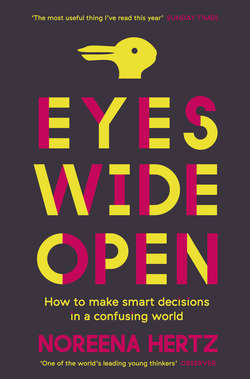Читать книгу Eyes Wide Open: How to Make Smart Decisions in a Confusing World - Noreena Hertz - Страница 17
The Unicycling Clown
ОглавлениеSometimes we are so focused on one thing in particular that we actually stop seeing the other things we need to take into account.
Just ask Dustin Randall.
One might think that, dressed in a vivid purple-and-yellow outfit, with large shoes and a bright-red nose, Dustin the clown would be pretty impossible to miss.
Especially when he was riding a unicycle around a small university campus square.
But researchers at the University of Washington discovered otherwise. When Dustin rode by people who were crossing the square while using their mobile phones, the vast majority completely failed to notice him.11 It was as if the unicycling clown simply wasn’t there.
This is an example of a phenomenon known as ‘inattentional blindness’,12 and it’s what happens when we’re very focused on one thing in particular – in this case a telephone conversation or an important text message. When we are focused like this, we typically don’t register new data points, new things that may come in to our sensory orbit. We can even miss highly visible objects we are looking directly at, because our attention is elsewhere.13 One professor rather brilliantly describes it as being ‘as if while the eyes “see” the object, the brain does not’.14
This is something we are all likely to have experienced. Have you ever bumped into a lamp-post while walking and texting? Or somehow missed seeing an important email in your inbox during a particularly busy week? If so, you can blame inattentional blindness.
There are times, of course, when tunnel vision clearly pays off – think of your hunter-gatherer ancestors, seeking out food and doing everything they could to avoid mortal danger. Once they heard the lion’s roar, there would only be two things to think about: working out where that roar was coming from, and running in the other direction. They would not have wanted to be distracted by anything else – the pain in their muscles as they ran, the sound of birds singing above, the sight of their favourite snack hanging from a tree – these would all have been irrelevant to their immediate survival.
But fast-forward a few millennia, and if you don’t want to get knocked over by a unicycling clown, miss a critical email or fail to spot a wrong charge on your credit-card statement, you’ll need to take your blinkers off and with eyes wide open improve your powers of attention and perception.
Think about what it is that is consuming your focus. At work, this may be your latest sales figures, or your company’s current stock price. At home, it may be the football scores. How many times a day do you check these? What might this mean you’re not paying attention to? Could you spend a day (or even a few hours) without looking at them? What would you notice that you hadn’t previously? And who around you could bring the unexpected to your attention? More on this point to come.
